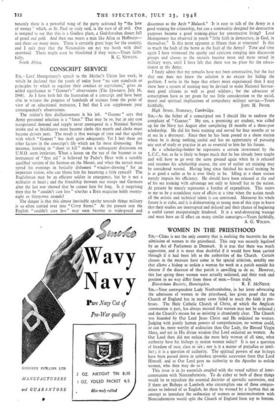CONSCRIPT SERVICE
Sra,—Lord Montgomery's speech to the Mother's Union last week, in which he declared that the youth of today have " no sure standards or principles by which to regulate their conduct or aspirations," gives an added significance to " Gunner's " observations (The Spectator, July 16, 1948). As I have both felt the frustration of a conscript and have been able to witness the progress of hundreds of trainees from the point of view of an educational instructor, I feel that I can supplement your correspondent's observations.
The soldier's first disillusionment is his job. " Gunner " says that Army personnel selection is a " farce." That may be so, but in any case occupational demand and supply never correspond in a National Service intake and so bricklayers must become clerks this month and clerks must become drivers next. The result is that wastage of time and that apathy with which " Gunner " has dealt quite adequately. Yet I feel there are other factors in the conscript's life which are far more distressing. For instance, learning to " shoot to kill" makes a subsequent discussion on U.N.O. seem irrelevant. When a lesson on the use of the bayonet as an instrument of " first aid " is followed by Padre's Hour with a suitably qualified version of the Sermon on the Mount, and when the recruit must spend his evenings in basically dishonest " window-dressing " for an important visitor, who can blame him for becoming a little cynical? The Englishman may be an efficient soldier in emergency, but he is not a militarist at heart ; and the friendship between our troops and Germans after the last war showed that he cannot hate for long. Is it surprising then that he " couldn't care less " whether a Bren magazine holds twenty- eight or thirty-two rounds?
The danger is that this almost inevitable apathy towards things military is so often carried over into " Civvy Street." At the present rate the English " couldn't, care less " may soon become as widespread and disastrous as the Arab "Maleesh." It is easy to talk of the Army as a good training for citizenship, but can a community designed for destructive purposes become a good training-place for constructive living? Lord Montgomery has observed in youth "little faith in democracy, in God, in themselves." Is this more apparent at fifteen than at nineteen? Is this so much the fault of the home as the fault of the Army? Time and time again I have witnessed the apathy and cynicism creeping into discussion groups and classes as the recruits become more and more versed in military ways, until I have felt that there was no place fcr the educa- tionist in the Army.
I freely admit that my remarks have not been constructive, but the fact that one does not know the solution is no excuse for hiding the problem. I write in the hope that others more experienced than I may show how a system of training may be devised to make National Service- men good citizens as well as good soldiers ; for the advocates of conscription have as yet given far too little consideration to the social, moral and spiritual implications of compulsory military service.—Yours


































 Previous page
Previous page